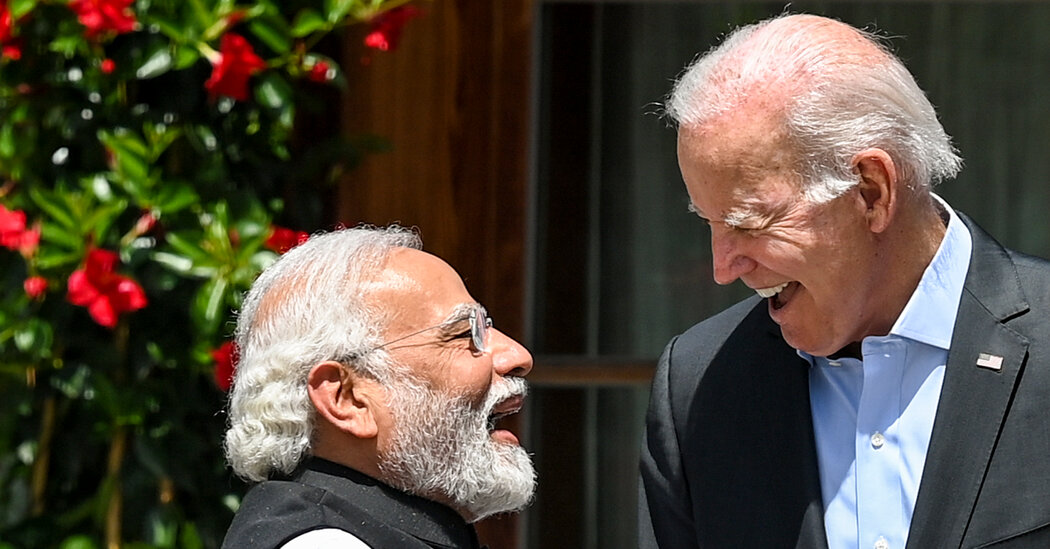
When Russia first invaded Ukraine, the United States warned India against buying more Russian oil, saying that New Delhi could face “consequences.” Now the West is softening its stance, emphasizing that India doesn’t need to choose sides.
The changing tone reflects the middle path that India is carving out for itself in this geopolitical crisis, as the nation tries to maximize its geopolitical leverage without limiting its economic opportunities. At the summit this week for the Group of 7 leaders, Prime Minister Narendra Modi of India, who was invited to attend, made pacts on climate action and development with the West while ignoring its entreaties to help isolate Russia.
India is also trying to position itself as the voice of poorer nations, arguing that sanctions hurt developing countries the most. It has defended its increasing purchases of Russian crude as a necessity at a time of rising inflation.
“All of you will also agree with this, that energy access should not be the privilege of the rich only — a poor family also has the same rights on energy,” said Mr. Modi at a G7 session. “And today, when energy costs are sky-high due to geopolitical tensions, it is more important to remember this thing.”
While the United States wants to intensify the global pressure against Russia, it also can’t risk alienating allies like India. It needs India as a counterweight on other issues, particularly the American strategy to contain China.
Ahead of the G7 summit, John Kirby, the U.S. National Security Council coordinator, described India as a “key strategic partner in the Indo-Pacific Region.” He said that the United States does not want to “coax them away” from Russia.
At the summit, President Joe Biden announced a $600 billion international infrastructure fund meant as an alternative to China’s Belt and Road Initiative, a big-money push by Beijing to create diplomatic ties around the world. India, Mr. Biden said, would be among the first beneficiaries.
“The kind of architecture the U.S. is trying to build in the Asia Pacific, it wouldn’t stand on the same legs without India in it,” said Pratyush Rao, a director at Control Risks, a consultancy that focuses on business and political risk. “I think India feels it can push the boundaries as long as that element still stays in the picture.”
Oil is at the heart of India’s balancing act.
In March, U.S. officials, including Mr. Biden, urged India to not increase energy purchases from Russia. India ignored them, doubling its imports.
India bought about 76 million barrels of Russian crude in four months, at a 30 percent discount to the global benchmark price.
Indian officials have repeatedly defended these purchases as a means to blunt the impact of higher food and fuel prices for the majority-poor population.
“We’re yet to recover from a pandemic,” said India’s petroleum minister, Hardeep Singh Puri, noting that the country is “still feeding” hundreds of millions of people and subsidizing vaccines.
“We have to look after our own interests,” he added.
It’s an important financial calculus for many nations. As the United States and Europe contemplate their next rounds of sanctions to isolate Russia, there is growing concern that the fallout is fueling an alarming hunger problem and energy crisis that will not easily be reversed.
Other South Asian nations have taken the same approach as India, remaining neutral but also trying to take advantage of cheap Russian oil. As its energy supplies run out, Sri Lanka is sending two ministers to Russia to negotiate.
“The ministers are going to Russia to try to source oil directly from the government,” Keheliya Rambukwella, Sri Lanka’s minister of health, said to The New York Times.
“We are trying everything to meet the demands” of residents, he added.
The West is starting to recognize that sanctions have done serious damage globally, without significantly crimping the Kremlin’s war machine. Energy prices have skyrocketed, helping to prop up Russia’s oil revenues. The United States is now pushing for a price cap on Russian oil as it looks for new ways to punish Moscow.
India has repeatedly called out the hypocrisy of the West’s demand on oil while Europe continues to fuel its own economies with Russian natural gas. European countries continue to receive the majority of their natural gas through pipelines from Russia.
In the first 100 days of the war, about three-quarters of Russia’s revenues from fossil fuels came from Europe, according to the Center for Research on Energy and Clean Air. Less than 5 percent came from India.
“Buying Russian gas is not funding the war?” Subrahmanyam Jaishankar, India’s foreign minister, said at a forum in Slovakia earlier this month. “Europe has to grow out of the mindset that Europe’s problems are the world’s problems, but the world’s problems are not Europe’s problems.”
In many ways, Mr. Modi is maintaining India’s traditional position of strategic autonomy.
India’s ties to Russia date to its independence, when few other nations recognized New Delhi’s currency or creditworthiness. Over the years, Russia has backed India at the United Nations on questions over the disputed Himalayan territory of Kashmir.
It is also India’s largest arms supplier. After a visit with Mr. Modi in April, Russia’s foreign minister, Sergey Lavrov, said the two countries were looking at ways to expand trade.
With threats on both of its borders, India has resisted calls from Western countries to join them in condemning the Russian invasion. Mr. Modi has maintained a neutral stance on the war, calling during the G7 summit for a resolution through diplomacy and dialogue.
At the same time, India’s prime minister is breaking from the past by showing less reticence to be part of overtly Western-led alliances, such as the Quad security grouping that includes the United States, Australia and Japan. As India’s largest market, the United States is also key to Mr. Modi’s ambitions to expand India’s economy by 8 to 9 percent annually.
“It’s like chess,” said Amitabh Mattoo, a former adviser to India’s National Security Council and a professor of international studies at Jawaharlal Nehru University in New Delhi. “Everyone is finding it tough to anticipate the move of the other.”
“Now let us see whether Jaishankar and Modi can play the middle game of this fascinating game of geopolitical chess in the manner of a grandmaster,” he added, “or will they falter?”




